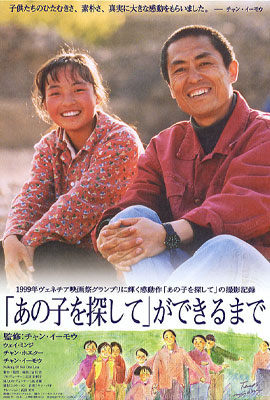
(1999)
directed by Zhang Yimou
Zhang Yimou, the director of “Not One Less,” is the acclaimed director of masterpieces like “Raise The Red Lantern” and “Ju Dou.” Those films are renowned for their lavish sets, for their breathtaking color cinematography, and for the brilliant performances of the actress Gong Li.
“Not One Less” is very different from those films. It is a beautiful example of the camera’s ability to document reality. The film is entirely faithful to the Italian neorealist tradition. It is simple, unadorned, and direct.
The actors in “Not One Less” are local people playing characters with their own names. This is consistent with the neorealist theory that everyone can play at least one role, namely, themselves. The town’s mayor is played by the town’s actual mayor. Wei Menzhi is a determined thirteen year old girl who plays Wei, an equally determined thirteen year old substitute teacher. The regular schoolmaster is absent because he is attending to his terminally ill mother. Wei’s assignment is to teach the elementary school class until the schoolmaster returns.
“Not One Less” upsets our usual expectations. Both Wei and her students are children. Wei is barely more advanced than her students. She is just a few inches taller than her students. Her main qualifications for the job seem to be that she has neat handwriting and that she can sing one song about Chairman Mao. There is more than a hint of irony when the students address her as “Teacher Wei.”
“Not One Less” reminds us that all over the world childhood is often about the serious business of earning money and surviving. Wei is focused on the one thing that matters most, her stipend. She gets strict instructions. She is limited to one piece of chalk for each day the regular teacher is absent. Most important of all, since the school’s subsidy depends on its head count, she is to return the full class to the teacher. Wei will receive a bonus if she can keep the class intact. The film’s title, “Not One Less,” refers to the fact that keeping all the students in the class is the most important objective.
The first part of the film records the details of day-to-day life at an elementary school in an isolated, poverty stricken corner of modern China. We watch as the class clown makes life miserable for Wei. This part of the film will undoubtedly remind you of your own early experiences with class clowns and substitute teachers.
When the class clown, Zhang, runs away to work in the city, Wei is determined to follow him and bring him back. This is a very challenging task. To begin with, Wei has to raise money to buy a bus ticket. Wei puts the class to work moving bricks at a local factory to earn money for a bus ticket. At the end of a hot day of labor in the brickyard, the entire class shares two lukewarm cans of Coca-Cola because that is all they can afford. The point of that days lesson? Work is exhausting and the rewards are meager! A valuable lesson, indeed!
The second part of the film tells the story of Wei’s adventures in the city as she searches for Zhang. Wei simply will not take no for an answer. Wei learns that Zhang has disappeared from his workplace in the city. After laborious but fruitless attempts to find him, Wei finally approaches a TV station. The manager of the TV station is impressed by her determination and features her on a top-rated “social issues” program. Zhang sees the show and turns himself in. The TV station returns Zhang and Wei to their village along with donations and extra chalk for their school.